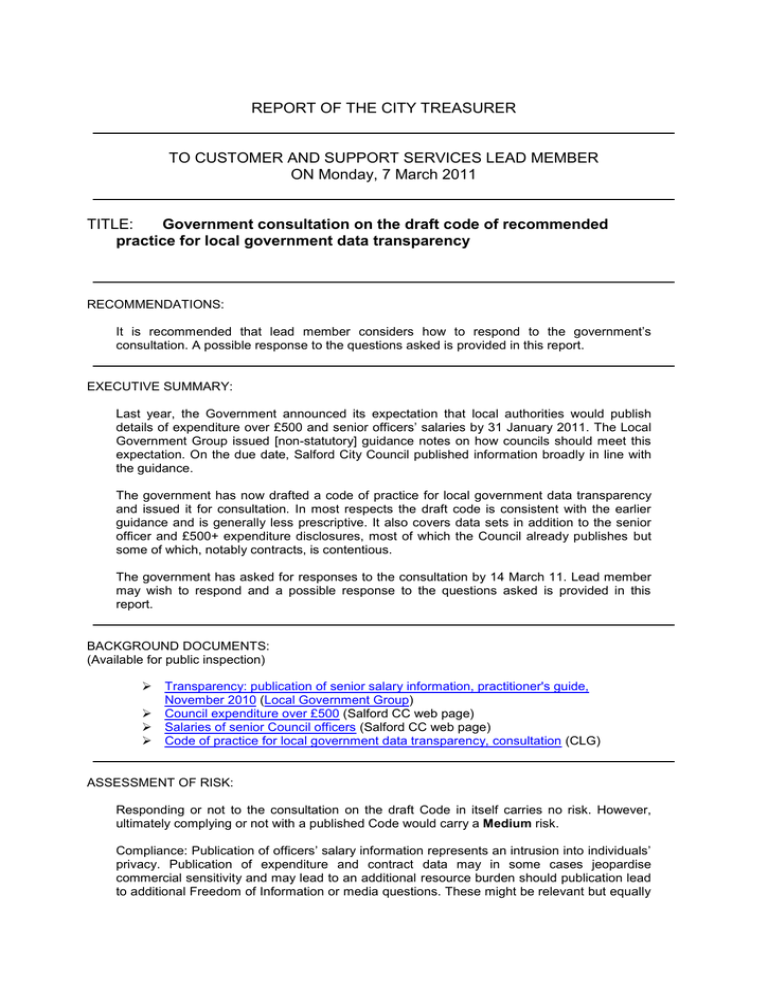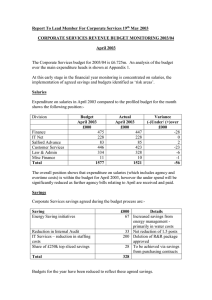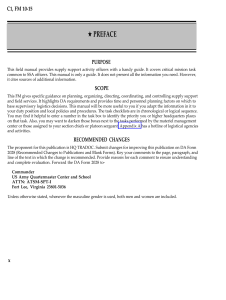REPORT OF THE CITY TREASURER ON Monday, 7 March 2011
advertisement

REPORT OF THE CITY TREASURER TO CUSTOMER AND SUPPORT SERVICES LEAD MEMBER ON Monday, 7 March 2011 TITLE: Government consultation on the draft code of recommended practice for local government data transparency RECOMMENDATIONS: It is recommended that lead member considers how to respond to the government’s consultation. A possible response to the questions asked is provided in this report. EXECUTIVE SUMMARY: Last year, the Government announced its expectation that local authorities would publish details of expenditure over £500 and senior officers’ salaries by 31 January 2011. The Local Government Group issued [non-statutory] guidance notes on how councils should meet this expectation. On the due date, Salford City Council published information broadly in line with the guidance. The government has now drafted a code of practice for local government data transparency and issued it for consultation. In most respects the draft code is consistent with the earlier guidance and is generally less prescriptive. It also covers data sets in addition to the senior officer and £500+ expenditure disclosures, most of which the Council already publishes but some of which, notably contracts, is contentious. The government has asked for responses to the consultation by 14 March 11. Lead member may wish to respond and a possible response to the questions asked is provided in this report. BACKGROUND DOCUMENTS: (Available for public inspection) Transparency: publication of senior salary information, practitioner's guide, November 2010 (Local Government Group) Council expenditure over £500 (Salford CC web page) Salaries of senior Council officers (Salford CC web page) Code of practice for local government data transparency, consultation (CLG) ASSESSMENT OF RISK: Responding or not to the consultation on the draft Code in itself carries no risk. However, ultimately complying or not with a published Code would carry a Medium risk. Compliance: Publication of officers’ salary information represents an intrusion into individuals’ privacy. Publication of expenditure and contract data may in some cases jeopardise commercial sensitivity and may lead to an additional resource burden should publication lead to additional Freedom of Information or media questions. These might be relevant but equally could be irrelevant and a distraction. Publication of contracts themselves could jeopardise partner relationships and the potential for successful procurement. The Council must ensure that it handles publication of any sensibly and complies with data protection legislation. Failure to comply: The code, as with the previously-issued guidance, is non-statutory. Nevertheless, failure to publish in accordance with the Code would carry a reputational risk should the Government and citizens view non-publication as deliberately withholding information. The secretary of state has announced his intention to make compliance statutory should authorities not voluntarily follow its recommendations. This would make nonpublication, or other failure to comply with its clauses, a breach of a statutory obligation. SOURCE OF FUNDING: The proposal in this report presumes that the various Council divisions concerned will extract, collate and publish data from within existing resources. COMMENTS OF THE CITY TREASURER (or his representative): The report has been prepared by officers in the Finance Division. ICT STEERING GROUP IMPLICATIONS (if applicable): Some advice has been sought from the Business and Information team in preparing this report. LEGAL (if applicable): The requirements of the Freedom of Information Act and the Data Protection Act have been considered in this report PROPERTY (if applicable): na HUMAN RESOURCES (if applicable): na CONTACT OFFICERS: Chris Hesketh, Principal Group Accountant, Corporate Accountancy Team, x2668 John Spink, City Treasurer, x3230 WARD(S) TO WHICH REPORT RELATE(S): None specifically KEY COUNCIL POLICIES: None DETAILS (Overleaf) 1 Introduction 1.1 Last year, the Government announced its expectation that local authorities would publish details of expenditure over £500 and senior officers’ salaries by 31 January 2011. The Local Government Group issued non-statutory guidance notes on how councils should meet this expectation. On the due date, Salford City Council published information broadly in line with the guidance. 1.2 In relation to expenditure over £500, only seven councils nationally failed to meet the deadline and only one of these, Nottingham, announced its intention not to comply, stating that the effort was “wasteful and a distraction”. 1.3 There was brief interest in the local media in relation to our own publication of expenditure lists, but few follow-up questions. Following publication, Cllr Merry publicly commented that it was unclear how publishing reams of data out of context helped to make the council transparent and accountable. 1.4 The government has now drafted a code of practice for local government data transparency [the Code] and issued it for consultation. If authorities do not follow the Code, the secretary of state has announced his intention to issue legislation to make compliance a statutory obligation. 1.5 The government has asked for responses to the consultation by 14 March 11. Lead member may wish to respond and a possible response to the questions asked is provided in this report. 2 The Code 2.1 In most respects the draft code is consistent with the earlier guidance on senior officer and £500+ expenditure disclosures and is generally less prescriptive. It also specifies additional data sets for disclosure, most of which the Council already publishes, although some, notably contracts, are contentious. 2.2 The specific requirements of the Code are set out below, along with a brief comment on the achievability and/or desirability of the item in question. 2.3 “Expenditure over £500, (including costs, supplier and transaction information). Any sole trader or body acting in a business capacity in receipt of payments of at least £500 of public money should expect such payments to be transparent. “ This data has already been published in line with the previous guidance 2.4 “Grants and payments under contract to the voluntary community and social enterprise sector should be clearly itemised and listed.“ The data already published identifies items by their accountancy code. Two such codes are “grants to voluntary organisations” and “payments to voluntary organisations” 2.5 “Senior salaries, names (with the option for individuals to refuse to consent for their name to be published) job descriptions, responsibilities, budgets and numbers of staff. “Senior salaries” is defined as being all salaries which are above £58,200 (irrespective of post), which is the Senior Civil Service minimum pay band. “ The option for names to be excluded is welcome. The definition of “above £58,200” provides some clarity which was lacking in Freedom of Information guidance although would capture more officers than the Council might feel appropriate. However, the requirement may in any case be considered to be a wasteful duplication: there is already a statutory obligation to publish salary information in the statement of accounts. To confuse the issue, that disclosure differs in both who should be included and what should be disclosed. 2.6 “An organisational chart of the staff structure of the local authority.“ While an additional unwelcome piece of work, this requirement would not be problematic. 2.7 “Councillor allowances and expenses.” This data is already published under statute. 2.8 “Copies of contracts and tenders to businesses and to the voluntary community and social enterprise sector.” The Council already publishes decision notices and, for tenders with a value above the EU threshold, notices in OJEU. In each these identify the name of the successful tenderers and the contract value. However, contracts themselves typically contain commercially sensitive information. Publication could jeopardise our relationship with partners. 2.9 “Policies, performance, audits and key indicators on the authorities’ fiscal and financial position.” Apart from audit reports, this data is routinely published. Some audit reports should be excluded under “part 2” and Freedom of Information exemptions, but the remainder could be published. 2.10 “Data of democratic running of the local authority including the constitution, election results, committee minutes, decision - making processes and records of decisions. “ This data is already routinely published (subject to “part 2” exemptions). 2.11 “Local authorities should develop an inventory of the data that they hold and ensure it is published. As data is highlighted to the widest possible audience public demand should grow and local authorities should expect to publish more information.” \While not problematic in itself, it is not clear how this inventory relates to the publication schedule already maintained under Freedom of Information guidance. 2.12 “These inventories should be registered on data.gov.uk to support a single point of access for all public data from national and local government.” £500 expenditure and senior officer salary data already published have been registered on this site. It is not problematic to add further items. 3 Consultation 3.1 The government has asked for responses to the consultation by 14 March 11. The questions asked, and a possible response, is provided in the annex to this report. Lead member is invited to delete, amend and/or add to this draft to ensure that an appropriate response is submitted from the Council. John Spink City treasurer Annex Consultation questions and possible responses 1. “Does the proposed Code and the principles contained within it help to create the conditions whereby local people will be able to hold local authorities to account?” Answer: We do not believe the Code’s requirements will make councils more transparent and accountable for the reasons set out below: For most of the data sets described, either publication is already required or this council and most others already make intelligent decisions on transparency and accountability and routinely publish information. In some cases, for example the publication of expenditure and contract data over £500, the Code merely forces the publication of reams of data without any context to set it all in. The Council routinely publishes budget information before the start of the year which is a far more helpful and useful source of information. In the case of contract publication, the Council is very concerned that the Code jeopardises our relationship with partners and threatens the success of public sector procurement activity. Contracts typically contain commercially sensitive information: existing partners and potential tenderers would be unlikely to want their technical and business practices and pricing structures open to scrutiny by their competitors. The Council already publishes decision notices and, for tenders with a value above the EU threshold, notices in OJEU. In each these identify the name of the successful tenderers and the contract value. We believe that this should be sufficient and that the Code should require no additional disclosure. 2. “The Government believes it is essential local people know how much funding is directed towards the voluntary and community groups and wants to increase local accountability on such spending decisions and the transfer of services to this sector. Are there additional, existing data sets that should be specified to increase transparency in this area?” Answer: A field within the Council’s current £500+ expenditure data would meet the Code’s requirement to identify payments and grants to voluntary organisations. The Council’s routinely-published budget pages are a useful source of information on the Council’s expenditure plans. We have no other recommendation on additional data sets. 3. “Does the proposed Code sufficiently support the publication and reuse of public data?” Answer: No comment on this question. [I believe it refers to the publication of tables in a .csv format which is not problematic. However, if we do object to the Code generally, “no comment” is probably the most appropriate response] 4. “Do you believe all the bodies covered in paragraph 3 of the proposed Code should be included?” Answer: We expect that, like Salford City Council, most councils will already be open and transparent. On that basis, we do not believe the Code would be particularly useful for any of those bodies. 5. “The Government’s preference is for a threshold of £58,200 to apply to disclosure of senior salaries in local authorities. This is intended to increase accountability and ensure salaries are consistent with level of responsibility. Would a ‘function test’ such as that used in Audit and Account Regulations in 2009 be better e.g. “a person who has responsibility for the management of the relevant body to the extent that the person has power to direct or control the major activities of the body (in particular activities involving the expenditure of money), whether solely or collectively with other persons”? Or a definition based on legal definitions e.g. the salaries of the head of paid staff, statutory chief officers, non-statutory chief officers and deputy chief officers, as defined in the Local Government and Housing Act 1989?” Answer: We consider that a disclosure different to that prescribed for a council’s statement of accounts is irrelevant and confusing. The Code should recognise that that disclosure is already made and make no other prescriptions.

